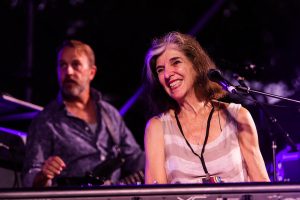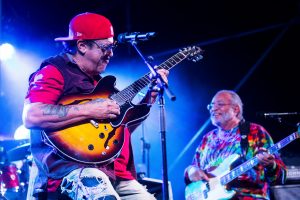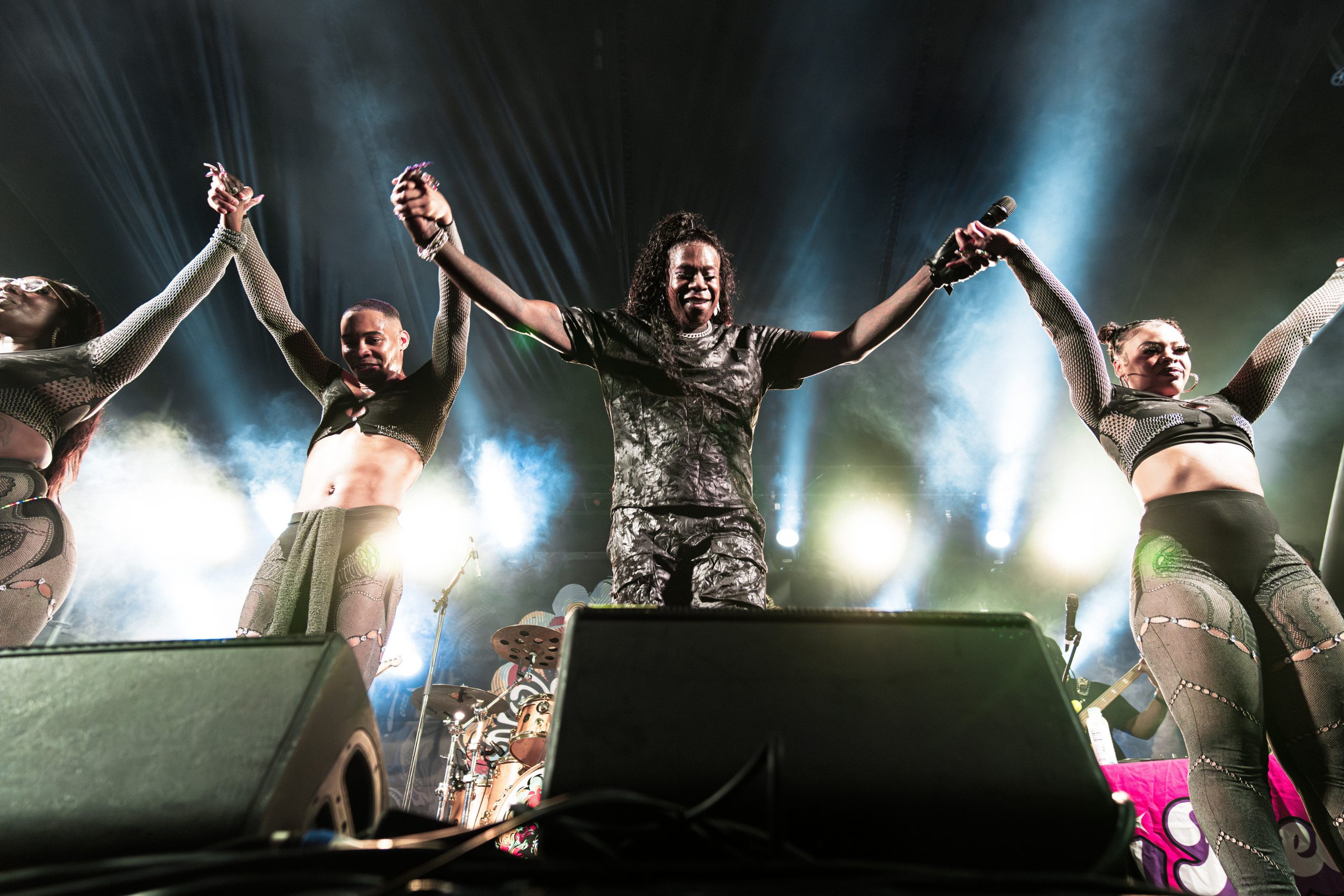To invoke the name of another popular festival, the NOLA Funk Fest was hardly strictly funk. True, there was plenty of uncut funk in the weekend lineup—but with the weekend’s headliners including the wildly eclectic Tank & the Bangas and the diva of bounce Big Freedia, it mostly honored funk as a cornerstone of the wider realm of New Orleans music. And with an audience including a fair share of out-of-town visitors, it also served as a mid-season Jazz Fest fix for the faithful.

Marcia Ball. Photo by OffBeat / Pats Moscardo
Some of the familiar acts put twists on their usual show. The New Orleans Suspects were joined by members of the Dirty Dozen (the former home of Suspects singer, guitarist Jake Eckert), for extended workouts on Dr. John’s “Right Place, Wrong Time” and Stevie Wonder’s “Superstition”. Marcia Ball stuck mainly with familiar material which isn’t a problem; she still does one of the most emotive takes of Randy Neman’s “Louisiana 1927” around.
Jon Cleary played with an expanded lineup of the Absolute Monster Gentlemen (with horns, percussion and a second keyboardist) and debuted a few songs from his forthcoming album—which, from the sound of things will be heavy on festive Mardi Gras grooves. He’s written a likely carnival hit with “Zulu Coconuts” whose chorus—“I don’t want no ifs and buts, just take your hands offa my nuts”—ensures he’ll be dodging requests for it for years to come.
Dumpstaphunk are already a notably different band since the loss during Jazz Fest of founding bassist, singer Nick Daniels (to whom the set was dedicated). The original concept was a stripped-down funk band with the novel instrumental hook of double bass guitars. With Tony Hall as sole bassist, the band now sports a horn section, two guitars and a frontwoman. It makes for a big, expansive sound, with ensemble playing emphasized over solos. The obvious highlight was “Make It After All,” a shot of pure uplift from Daniels’ pen.
Bobby Rush claims to be the oldest performing bluesman, with a few months on Buddy Guy, and who’s gonna argue? His set was the biggest departure of the weekend, as he played solo acoustic and reached back to “Chicken Heads,” the 1971 cult classic. But even in thoughtful mode, Rush retained some of the salty humor of his later ’70s recordings, which showed a funkier take on the Blowfly type sensibility.

Leo Nocentelli and George Porter photo by OffBeat / Pats Moscardo
You can’t have a New Orleans funk fest without some incarnation of the Meters, and there was an especially tasty one in GeoLeo (not to be confused with LeoGeo, an early-’80s incarnation with the same two gentlemen). Founding Meters Leo Nocentelli and George Porter Jr. were joined by the dream team of Ivan Neville and Stanton Moore, and the apparent goal was playing the songs closer to the recorded versions. This meant breaking between tunes, restoring the Toussaint horn charts on “Hey Pocky Way” and “Just Kissed My Baby,” and reining in the long jams that were standard in later Meters and Funky Meters shows. Nocentelli’s solos were especially fiery in this context, as he had to say it all in a shorter space; and Moore had the Zigaboo grooves down pat. They also honored the songbook by digging up rarely played songs like “Chicken Strut” (which was seldom played because nobody wanted to make the chicken noises), “Hand-Clapping Song” and “Whatcha Say”—the latter of which I’m pretty sure I’d never heard done live. Another great Meters rarity, “Stay Away” was played during Porter’s Friday set with the Runnin’ Partners, which was dedicated to another lost funk brother, David Russell Batiste, Jr.

Big Freedia photo by OffBeat / Pats Moscardo
Finally, you know the world is in good shape when Big Freedia can headline a mainstream festival without toning down the act from the days when sissy bounce was strictly underground, and the crowd singalong of “Gin in My System” was a pleasure to see. As was the Sunday set by Tank & the Bangas, who’ve kept their adventurous streak as they’ve gotten bigger. The main change I’ve noticed in the band over the past couple of years is that the Bangas are now in perfect sync with frontwoman Tarriona “Tank” Ball’s flow: When she segues from old-school soul to a bounce homage they go right along with her, never stepping out to display their chops unless a song calls for it. Ball is even more of a force as a frontwoman, projecting the strength and self-assurance that many of her lyrics are about; not many performers could put a long stretch of spoken-word material into an otherwise high-volume set without losing the momentum. During one tune she mockingly quoted people who ask her “Are you a poet, a rapper, or a singer?” And she did that during a song where she sang, rapped, and recited poetry.




